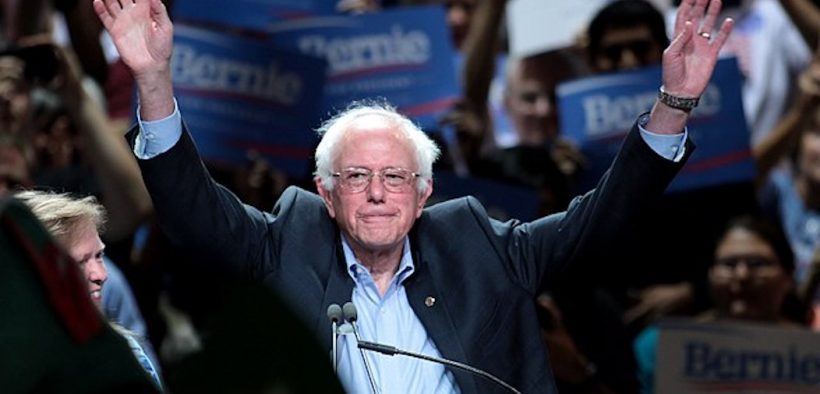Putting ‘Getting Things Done’ in Context

Let’s put aside vague, top-down conceptualizations of “getting things done” in favor of mobilizing voters and encouraging citizens to get involved at various levels of government.
As a Bernie supporter dating back to 2016, many things stick in my proverbial craw, but one turn of phrase even today still grinds my likewise proverbial gears. When asked during a Democratic debate in October 2015 by Anderson Cooper whether she is a moderate or a progressive, Hillary Clinton remarked, “I’m a progressive, but I’m a progressive who likes to get things done.”
Ooh! Sen. Sanders, did you feel that sick burn?
Without wanting to delve into Clinton’s history and go tit for tat, pointing out all the things she may not have “gotten done”—like, for instance, actually winning the 2016 presidential election—the litmus test of getting things done remains problematic because of how unevenly and borderline disingenuously it gets applied, specifically as it concerns authentically progressive candidates.
For that matter, I’ve witnessed it being used by supporters of one progressive candidate against another. You probably have an idea about where I’m going with this. Anecdotally, I’ve seen some Elizabeth Warren fans take shots at Bernie, asking, for all his 28 years in the House of Representatives and the Senate, what has he, you know, done? Presumably, some of these Warren supporters were Hillary supporters from the last campaign cycle, so the same line of attack about what the senator from Vermont has accomplished may yet be fresh in their minds. For a select few, there may additionally be some misdirected resentment in accordance with the notion Bernie is not a “true Democrat” and was a chief reason why Donald Trump won. Poor Hillary. It’s never her fault.
Key to the do-nothing-Bernie argument is a glance at his legislative record, particularly the legislation for which he was primary sponsor actually getting enacted. His objectors will point out that, in over two decades in Congress, Sanders has only had seven of his resolutions/bills ratified: four from his time in the House, three in the Senate. Five of these motions enacted are germane mostly to his home state, including two pieces of legislation which served to designate post offices after someone specific. Not altogether scintillating stuff. The other two specifically addressed cost-of-living adjustments for veterans and updating the federal charter for the Veterans of Foreign Wars. Again, you may find yourself uninspired unless you were specifically impacted by these changes.
What this line of thinking fails to account for is the context in which these bills were introduced. After all, this is Congress we’re talking about here, an institution not exactly known for its prolific productivity. The very GovTrack.us showcase of Sanders’s sponsored legislation linked to above helps explain this reality.
Does 7 not sound like a lot? Very few bills are ever enacted — most legislators sponsor only a handful that are signed into law. But there are other legislative activities that we don’t track that are also important, including offering amendments, committee work and oversight of the other branches, and constituent services.
Right. There’s a bigger picture to be appreciated. On the subject of committee work, Bernie is a ranking member of the Senate Committee on the Budget and a member of the Health, Education, Labor, and Pensions; Energy and Natural Resources; Environment and Public Works; and Veterans’ Affairs committees. So there’s that.
Such analysis also doesn’t consider the over 200 bills/resolutions signed by the president to which Sanders added his name as a co-sponsor since being sworn in as a U.S. Representative in 1991. As it must be clarified, not all of these are watershed legislative achievements. I mean, from my count, nine of these co-sponsorships were related to commemorative coins. Still, to imply inaction on Bernie’s part is misleading.
Moreover, this ignores all the times Sen. Sanders has shown leadership on a bill that, through no fault of his own, hasn’t been passed. Look at his recent offerings. Recognizing the “climate emergency” for what it is. College for All. Medicare for All. Social Security expansion. Raising wages. Lowering drug prices. These were all proposed this year. Just because this legislation is dead on arrival in a GOP-controlled Senate with a Republican in the White House doesn’t confer meaninglessness. It signals the individual proposing it is willing to fight for things worth fighting for.
This is before we even get to the issue of when political expediency “gets things done” but not necessarily in a way that is productive for all Americans. Back in June, Joe Biden touted his ability to work with the likes of James Eastland and Herman Talmadge to pass legislation, waxing nostalgic on the “civility” that could be afforded to all parties.
Beyond the obvious problem that Biden is touting his ability to work with Southern segregationists in—let me highlight this in my notes—2019, that communal effort may not be what it’s cracked up to be. The former VP has received his due criticism from Kamala Harris and other Democratic rivals for allying with segregationists in opposition of busing to integrate schools. Next to his legacy as “an architect of mass incarceration,” as Cory Booker put it, Biden’s willingness to compromise paints him in a rather poor light. It certainly clouds his purported credentials of being a champion of civil rights.
It’s not just with Bernie either. Across the board for Democrats, it seems instructive to view legislative efforts through the lens of what party controls each house and who is potentially waiting to sign a passed bill in the Oval Office. Republicans, led by shameless obstructionist and judiciary stacker Mitch McConnell, control the Senate. Donald Trump, who appears to have a death grip on today’s iteration of the GOP, is president. Should we fault Sen. Warren for watching Trump and Co. dismantle the Consumer Financial Protection Bureau before her eyes? Should we admonish Alexandria Ocasio-Cortez and other members of The Squad for voting their conscience only to see Senate Republicans or moderate Democrats in either house stand in their way?
Centrists like Nancy Pelosi may sneer at progressives who “have their following” only to see their votes outnumbered or their voices drowned out by appeals to civility and expediency. Absent the ability to lead, however, the progress they seek is all but nullified. There’s a reason why figures like Sanders and AOC are so popular when Congress as a whole is not. The policy positions they embrace are, by and large, supported by the American public. What’s not lacking is their commitment. It’s the political will to see their initiatives through.
Key to the Clintonian-Bidenesque “getting things done” mentality is a firm belief in the value of bipartisanship, of reaching across the aisle in the name of advancing legislation. Say the right things. Make the right amendments. Pull the right levers. Eventually, a workable bill will come out. That’s how things are supposed to work, in theory. Reasonable people making reasonable policies.
Amid the dysfunction of today’s Congress, this ideal still appears to hold water with the general public. How else to explain Joe Biden’s continued hold on the top of Democratic Party polls after two poor showings in the debates and despite a history of gaffes and poor decisions? Unless some voters are simply happy enough to have some semblance of Barack Obama’s presidency back. If we could just go back to the days before the era of President Donald Trump, everything would be back to normal, right?
Maybe, maybe not. Biden may reminisce fondly about the days when Democrats and Republicans could get along peaceably or believe that once “sensible” leadership is restored to Washington, the GOP will cut the malarkey and retake the mantle of responsible stewards of the country. He arguably both underestimates the polarization of the current political climate and overestimates his own deal-making ability in doing so, though.
Today’s Republican Party isn’t your granddaddy’s Republican Party, simply put. Not when the president is lashing out against his critics on Twitter daily, getting policy directives from FOX News, and putting the nation on the path to a dictatorship. Not when members of the party are actively denying the severity of our climate crisis or pretending that white nationalism doesn’t exist. Not when party leaders are defending the inhumane treatment of migrants at our border and are sharing derogatory memes about Alexandria Ocasio-Cortez and her progressive colleagues with impunity.
For those of us who aren’t old enough to recall an environment like the one Biden envisions, this is all we know of the GOP, and based on how low it has sunk and continues to sink, there’s every reason to believe it has reached the point of no return—if things were even that good to begin with. Once we take off our rose-colored glasses and re-appraise past decisions from intersectional perspectives, we may come to realize just how devastating certain policies spearheaded by both parties have been for Americans outside the so-called ruling class.
In addition to his checkered civil rights record, Biden’s cozy relationship with the banking, financial services, and insurance industries contrasts starkly with his image as a blue-collar champion. Given a crowded Democratic primary field and ample resources with which to evaluate his overall record, this may turn out to be a liability. That is, even if he earns the party nomination, there’s still the matter of the general election. Trump seemingly defied the odds against Hillary Clinton, in many respects a superior candidate. Who’s to say doubling down on someone like Biden won’t backfire, leaving us with a second term of President Trump? If he’s doing and saying all these reprehensible things now, what will this mean when he gets re-elected and has nothing to lose?
Going back to the days of bipartisan cooperation under past administrations may have its superficial appeal to voters, especially moderate whites who can better afford to be casual political participants. Even that relative comfort may be illusory, however. The climate emergency is not going to fix itself. Nor is the student debt crisis or the health care affordability crisis or our crumbling infrastructure or any other serious dilemma facing our world. Simply put, the stakes are higher now and Obama-era notions of hope and change dissolving into incrementalism aren’t sufficient. It’s going to take more than that. It’s going to take real people power.
Let’s therefore put aside vague, top-down conceptualizations of “getting things done” in favor of mobilizing voters and encouraging citizens to get involved at various levels of government. We’ve got the people. We only need the conviction to see it through. If you’re not on board with a progressive vision for our future, don’t worry about what is politically “feasible” or what can get done. Worry about getting out of the way of those determined to lead.







